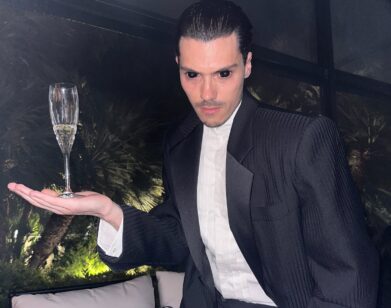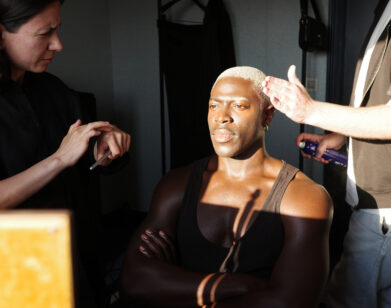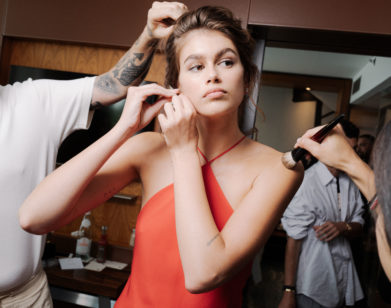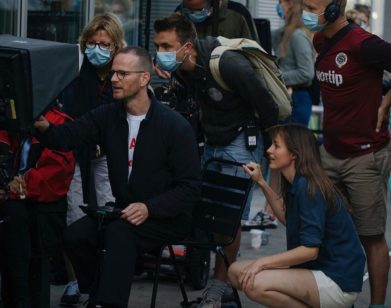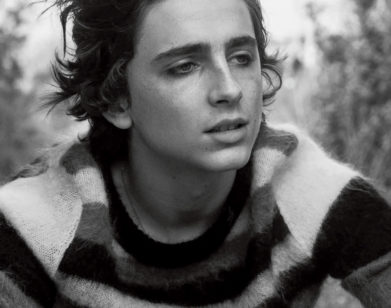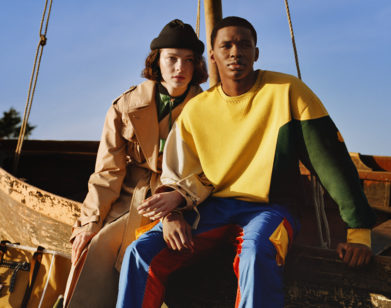DIRECTOR
Molly Manning Walker Wants to Talk About Sex
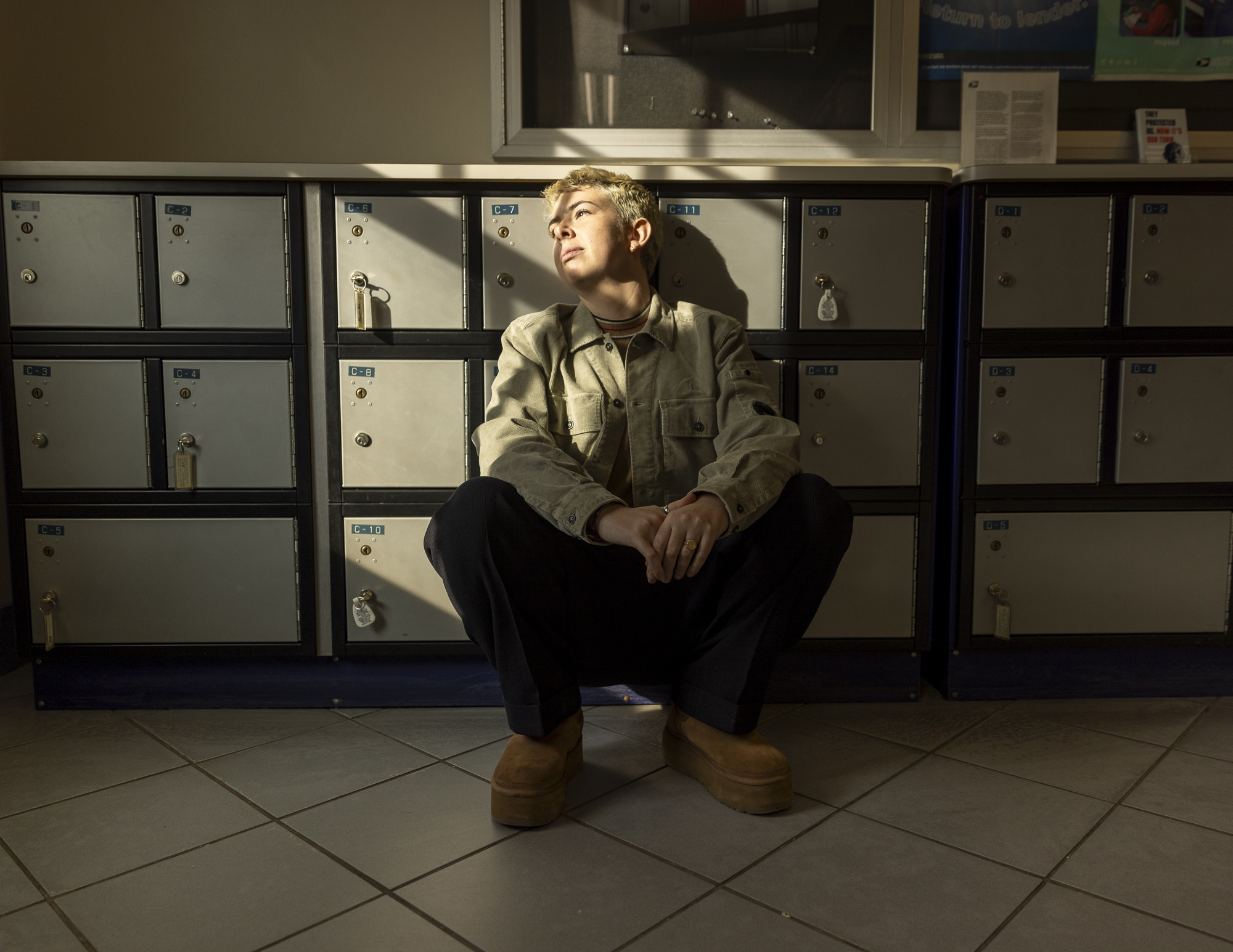
Molly Manning Walker, photographed by Myles Pettengill.
Molly Manning Walker is having a moment. The director, writer and cinematographer earned the prestigious Un Certain Regard award at Cannes last years—and an eight-minute standing ovation and for her debut feature. How To Have Sex is an entrancing exploration of the quintessential British lads holiday, an awkward and brazen rite of passage trip that involves copious drinking and, of course, having sex with strangers. Concerned with the grey areas of consent and pleasure, Manning Walker homes in on the emotional magnitude of teenagers reaching sexual consciousness against the backdrop of hazy clubs and saturated beaches. “It’s doing numbers and turning people’s heads,” said friend and I May Destroy You star Paapa Essiedu when he and Manning Walker got on a call earlier this year. “It’s doing something very important for British cinema.” As Manning Walker’s debut nears it U.S. release date, here and Essiedu talked grey areas, coordinating intimacy, and the coming-of-age films of Andrea Arnold.
———
ESSIEDU: What you telling me? How are you?
MANNING WALKER: I’m good. How are you?
ESSIEDU: I’m alright. I feel like I’ve seen you more than I’ve seen my family in the last month or so. We’re like ships in the night. I’ll see you and then you get ambushed by the great and the good of the film industry. I’m so excited to talk to you, Molly. I think you are astonishingly cool.
MANNING WALKER: You’re very cool.
ESSIEDU: And very fucking smart. I’m so delighted for the plethora of things that are popping off for you right now. I’d love to know about what your journey towards picking up a camera for the first time was like.
MANNING WALKER: I thought I wanted to do photography through art school, and I went to Occupy London. It was a political movement and I went to take photos and ended up making a documentary because I felt like what was being said was more important than what was being seen. Then I really wanted to be a documentary filmmaker and went to Bournemouth [University] to study documentary and cinematography. The documentary course really didn’t give you any money. It was like, go and hustle on your own, so I landed in fiction filmmaking, doing cinematography there. And the only way to guarantee that you would shoot your grad film was to write it as well. So I ended up writing and shooting it and my best friend directed it. Then when we left, he got into commercials and I ended up shooting commercials for him. It wasn’t until I was like, “Oh, I really miss storytelling,” that I went back to NFCS [National Film and Cinematography School]. When I was there, I felt like I was telling stories that I wasn’t that engaged with, and they weren’t sitting right with me politically. So I made my short and it escalated from there.
ESSIEDU: So were there people when you were at that stage in your career that really inspired you or whose work you desired to emulate?
MANNING WALKER: I think Andrea Arnold’s been the big one for me from the beginning. I was a big Fish Tank and American Honey fan. This idea of capturing what feels like reality and talking about stuff that’s really real, but being in control and telling a story withinm was always something that I was like, “That’s amazing.” It doesn’t feel like I’m watching someone’s opinion on a subject, if that makes sense.
ESSIEDU: I remember watching Fish Tank for the first time and finding it really hard to figure out whether it was a documentary or a film. She’s got an incredible ability for capturing life, but still having real intention in the way that it’s communicated on the camera and to the viewer.
MANNING WALKER: Totally. And being in control of what you’re trying to say, but also letting it be part of a life that we all recognize.
ESSIEDU: Let’s talk about this movie [How To Have Sex]. I love this film so much. I thought it was a real game changer. It’s doing numbers and turning people’s heads, and it’s doing something very important for British cinema. British cinema right now is in rude health, and what you’re doing is at the vanguard of it. Props to you for that. Where did the idea come from? Did it just fly out of you or did it take time to put it together?
MANNING WALKER: It came from a bunch of holidays that I went on when I was that age, and from different memories that stayed with me in quite a vivid way. One of them, especially the blowjob scene on stage in the film, we had witnessed in Magaluf. On reflection, at the time, I was so shocked by it, but pretending to be like, “Woo hoo, we’re having so much fun.” Then when I spoke to all my mates about it, I think everyone felt the same, but we were all just pretending to be like, “This is the best night ever. Wow, isn’t this crazy?” That’s what triggered the idea.
ESSIEDU: Wow. So that blowjob scene, you actually witnessed? Was that with one of your groups or just someone that you saw on stage?
MANNING WALKER: Yeah, we were on a bar crawl and it started all sexual. It was like passing shot glasses between your mouths and drinking them, or drinking liquid out of someone’s bra. And then as people got more trashed, it escalated. I remember being on a pool table and I was like, “Can we get two guys on stage?” And we’re like, “Yeah.” Then these two guys went on and they were like, “Whoever gets hard first wins.” We were just like, “Whoa.” Then the next day we were at a party hotel with a DJ in the middle of the swimming pool, and she was like, “Come and tell us your joke stories from last night and get free shots.” This girl swam over and she was like, “I gave a blowjob on stage last night.” Everyone was like, “Yeah!!!” She took the shots in the middle of the day. I was like, “Fuck me, man.”
ESSIEDU: I had so much nostalgia for that time in your life when everything feels new and chaotic and exciting and dangerous. But this film really made me think, “Wow, this is actually an industry. People are capitalizing and monetizing that feeling.” Do you know what I mean? Let’s talk about casting, because the cast in this movie feel like they’re street-casted. Can we talk about the process, who you started off with?
MANNING WALKER: Yeah. I cast it with Isabella Odoffin, who I’ve got a lot of time for. I think she’s a wizard. We asked for tapes, but we also asked for TikToks, which threw some of the actors out because they were like, “What do you mean a TikTok?” So we started with Mia and Tara. We were really worried about the Tara role because this idea of someone being really confident but having stuff going on underneath was what we were looking for. When she taped, we were instantly like, “We’ve got to get her in.” There was a slight worry that she was a bit too old because she was 24 at the time, and she was playing 16. So we did some screen tests to try and make sure we kept the age down. But because we cast her so early, we had the luxury of screen testing her with everyone that came in. It was a really extensive six-month process.
ESSIEDU: It’s an incredibly collaborative film, and so many of the things that are unique and singular about it appear in the nuance of those relationships, which I guess comes through all that time that you guys spent together. Can you talk a bit about what your ambitions were with the film and what themes that you set out trying to explore?
MANNING WALKER: The ambition was to look at the pressure on young people to have sex from all angles, from female friendship, from toxic masculinity, from the space itself. There’s a naked lady prop hidden in each scene, whether it’s a naked lady towel or lighter or shot glass. But this idea that it comes from the environment, and it’s inescapable. It’s like, not only are the reps involved, everyone’s involved in this situation. So, my aim was to talk about consent being less binary and more about two people having a good time. No one at school every taught us that sex is meant to be this pleasurable thing where two people have a great time and they can connect even if it’s not love. If someone had said that to me when I was 16, boy would I be in a better place. I thought it was a very personal story. I thought maybe a few women would feel seen, but I didn’t realize the magnitude until we started shooting and people were realizing stuff that they had experienced. It snowballed from there when we started putting it out into the world, where we realized that women and lots of men also have had similar experiences to Tara. What I also didn’t realize when we put it out was there were lots of men recognizing their own behavior in Paddy and saying, “I see what I’ve done and I am open to change.” And that feels quite radical.
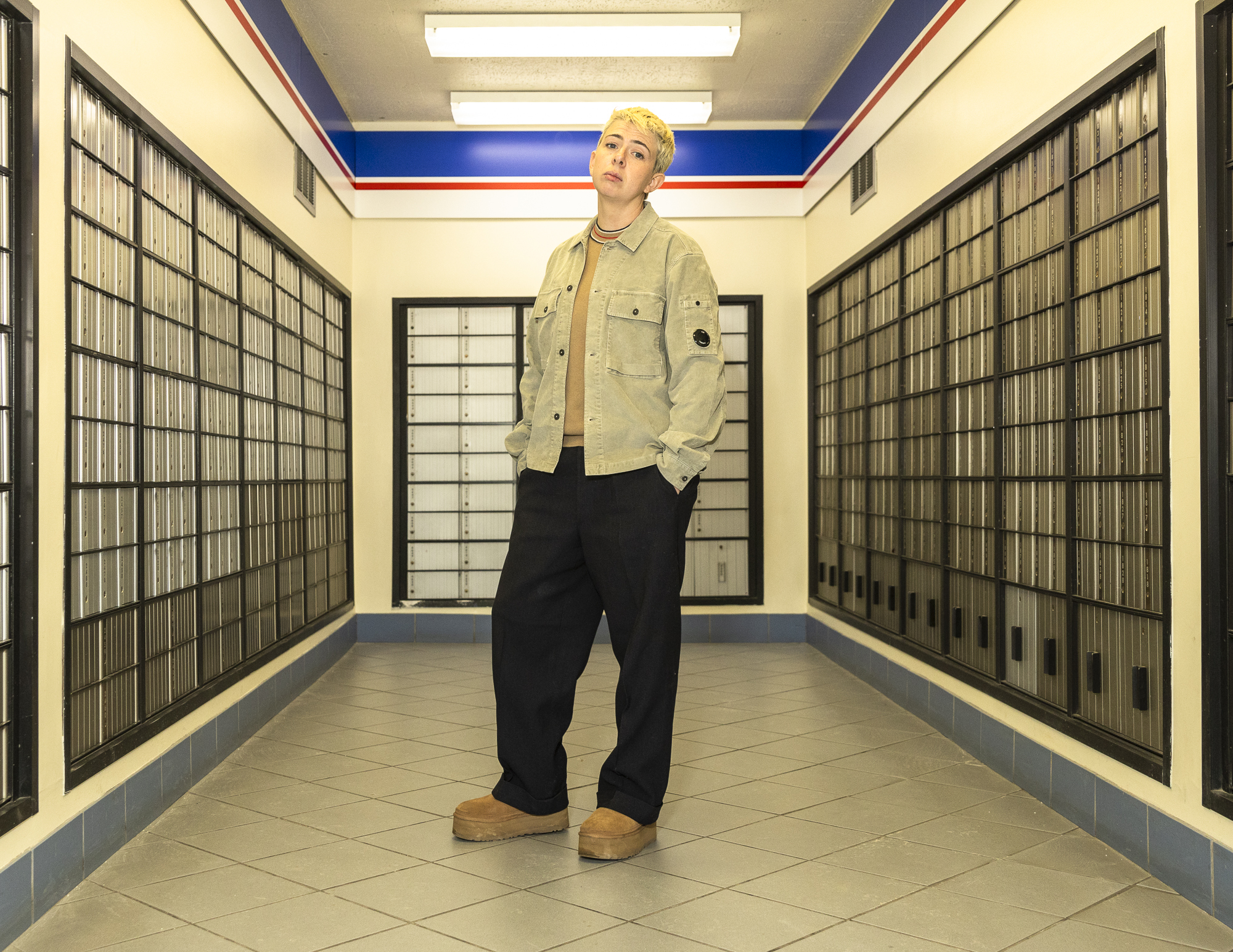
Molly Manning Walker photographed by Myles Pettengill.
ESSIEDU: I’d really love to hear you talk a bit more about Paddy and your choice to portray him in his truth, and not be too much into demonizing him. I found that really impactful, and I think that’s probably what a lot of men connect with, because that’s a particular time when this idea of a gray area doesn’t even exist. Everyone’s so much charged by hormones and peer pressure and an idea of what they should be doing, and it’s therefore leading people to behave in ways or push the envelope in ways that are really dangerous.
MANNING WALKER: Yeah. Sam’s an amazing actor and it was really difficult for him to understand where and why you do these things as a person. And so it was a constant conversation of: “How much does he know what he’s doing, how much does he understand it, how much is he a product of his society?” And actually, he thinks that this is how you have sex. One of the main things for us was that we didn’t want to lock men out of the conversation. In the edit there was this really fine line of how evil he comes across. There was a moment where Sam almost didn’t take the role because he was like, “I can’t feel this character, I don’t know who he is, I can’t recognize him.” Obviously that says volumes about Sam being a lovely human. But I’m really glad he did because it takes a good actor to allow people to recognize themselves and help that change.
ESSIEDU: And what was it like shooting those scenes on the beach, particularly in the bedroom? What was the process around it?
MANNING WALKER: We had a great intimacy coordinator called Jen Odell. Everything was highly choreographed. That was probably the most rehearsed scene in the film. The one on the beach was particularly techie because it was a conversation, sat down, then into the sea, then out of the sea. You’re wet, you’re dry. We had to break it up into all these in the middle of the night. It was techie as well as emotional and really hard for the actors. I think a lot more of the crew were cognitively figuring out, “Oh, that’s not okay to do that stuff while we were shooting it,” which was quite a big responsibility. It was about creating a culture where everyone felt really safe on set to just stand up at any moment and be like, “Do you know what? This is too difficult for me. I need 10 minutes.” We did that multiple times while we were shooting. So, rather than people having breakdowns in week three and saying, “I can’t go on,” we stopped as we went and were constantly checking in with people.
ESSIEDU: So, what’s a Molly Manning Walker set like?
MANNING WALKER: We played football every Sunday, which sounds silly, but being on the same team as the UPM and them being like, “Great goal,” on a Monday morning, suddenly I know the UPM’s name because we’ve played football all the way through prep. That makes a big difference to the atmosphere, where everyone feels like they’re loved and part of the team. My whole thing is, if you inspire everyone to be there, your job gets so much easier. Obviously you have to protect boundaries, but that’s way better for me than having to lift it all on my own shoulders and inspire people to be like, “We’re really making this great thing, I promise!”
ESSIEDU: I think so much of that work is also about respecting everybody’s excellence. People always want to hear about what the actors were like, what the director is like. But there are so many people who do so many different things and are all fucking amazing. Carpenters, electricians, the person doing the props. It’s a beautiful way to celebrate everyone’s brilliance, to invite people to have a level of democracy and equality.
MANNING WALKER: Totally.
ESSIEDU: But I hear you’re serious on the football pitch. I’ve got a friend who plays on your team.
MANNING WALKER: [Laughs] I don’t know. I’m rusty at the moment, but I try my best.
ESSIEDU: One thing I have to ask, which is really boring, is whether you’ve started thinking about what happens after this press tour ends. Are you going to be holding the camera or behind the monitor? Or are you going to be producing or writing?
MANNING WALKER: I hope to carry on directing and writing my own stuff. And then also I’d like to carry on shooting if the opportunity comes around. I’m trying to stay free and open to the possibilities of different collaborations.
ESSIEDU: Well, I’m leaving my agent’s email.
MANNING WALKER: I’m coming for you. Don’t throw yourself up because I’ll be knocking.
ESSIEDU: I’m ready.

